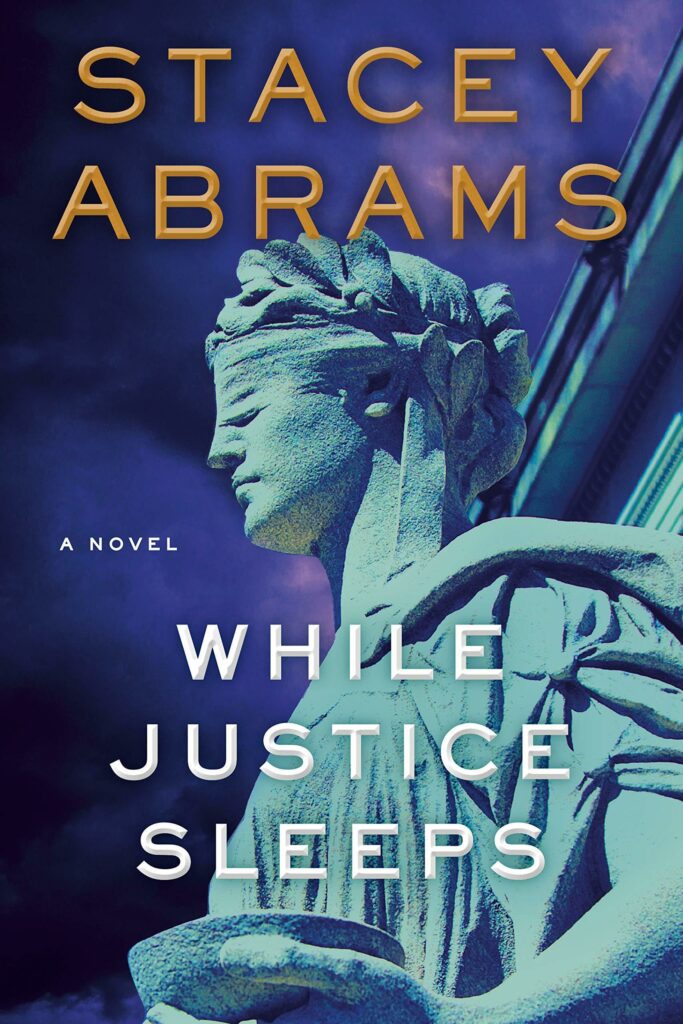
A Constitutional Quirk Inspired Stacey Abrams’ New Fiction Thriller, ‘While Justice Sleeps’
LISTEN
BY LULU GARCIA-NAVARRO
A Supreme Court justice is gravely ill, ideological control of the court hangs in the balance — throw in a ruthless president and an international conspiracy, and what you have is the plot of Stacey Abrams’s new novel, While Justice Sleeps. Yes, that Stacey Abrams, the Georgia politician, and she’s written a thriller ripped straight from the headlines — inspired by a conversation over lunch with her mentor.
“One day she was just musing about this strange phenomenon in the Constitution, and she asked me if I had ever thought about it for a book,” Abrams recalls. “And I said, no, I’d never really given it thought that Article III, which is the only provision in the Constitution that gives someone a lifetime appointment, has no failsafe for a person being physically unable to do the job.”
This is far from Abrams’s first book. She’s been writing romance novels since her time at Yale Law School — but she managed to write this new thriller in the midst of the 2020 election cycle, in which she played a pivotal role.

While Justice Sleeps by Stacey Abrams
“Luckily, I started the book more than a decade ago and I had an extraordinary editor,” she says. “I would tell him, just ignore the pings on your computer that will happen around 2:00 or 3:00 a.m. — and we we were able to get it done.”
Interview Highlights
On why writing is important to her
I love writing. I learned to write almost as soon as I learned to read. I went through a teenage phase where I wrote Christian rock and country music. Turns out those are not genres for me, but I see it both as a passion, but it’s also an avocation. I used to say when I wrote my romance novels, I could pay car notes but not buy a car. And now I’m in a place where the purchasing power of my writing is slightly higher and I appreciate it.
On the main character, a Supreme Court clerk named Avery
Avery is smart and guarded. She’s cynical, but she loves her friends. She’s got a mother who struggles with drug addiction and she’s her mother’s primary caretaker. She is also driven and wants to be more than her circumstances would suggest she could become. And when she comes into work one morning, she is summoned to see the Chief Justice of the Supreme Court and learns that she has been appointed the legal guardian of her boss, the Associate Justice of the Supreme Court, and the swing vote for major cases.
On what political thrillers say about the nature of government
The nature of government, the nature of bureaucracy requires that we relinquish so much information, but there is always embedded in there the possibility of someone misusing what you provide. As someone who was a bureaucrat who’s read these copious reports during my time as a program analyst for the OMB, there’s a lot of information out there and we may choose to allow more access, but it needs to be a choice as opposed to something that just happens around us.
I am not a conspiracy theorist. I am someone who recognizes that fiction, good fiction relies on getting as close to the truth as possible and then twisting it into suspense, fear. And it has to seem like it could happen if it’s going to work.
On recent Republican efforts to restrict voting
Well, I want to push back first on the notion that this is simply a Democratic versus Republican debate. The challenge is that these laws do not use partisanship as their language. They target communities based on their behaviors. And what we have seen happen in Georgia, in Florida, what they did in Iowa is to identify behaviors that they found to be anathema to their victories. While the targets may be communities of color or young people or the disabled, eventually the harm is to all of our communities because we are diminishing the ability for our fellow Americans to participate in elections. And that’s what should be frightening to all.
Communities of color have disproportionately been supportive of Democrats and thus have become a target of Republican changes to voting rights. But what I worry about is that rather than both parties having to compete based on their ideas and their policies, we are instead seeing a rigging of the game, a changing of the rules, because that’s easier than actually having to argue for a community to support your ideas.
On the viral video of her response to Senator John Kennedy, and the possibility of being underestimated
I can’t speak to Senator Kennedy’s intent, what he expected of me in terms of my performance. My hope is that what people saw and what they respond to is that I’m not simply engaging in hyperbolic denunciation of these laws, that I know what I’m talking about. And I think for especially for women and women of color in particular, we are expected to know what we’re talking about with a degree of specificity that is often not expected always of our counterparts.
When you are fighting for something, when there are those in power who do not want you to have it, you have a superior obligation to try to demonstrate the importance of change. And I find that the best way to do that is to have all the information at my disposal and to tell a good story about why it needs to be done differently.
This story was edited for radio by Ed McNulty and Ian Stewart, and adapted for the Web by Petra Mayer















